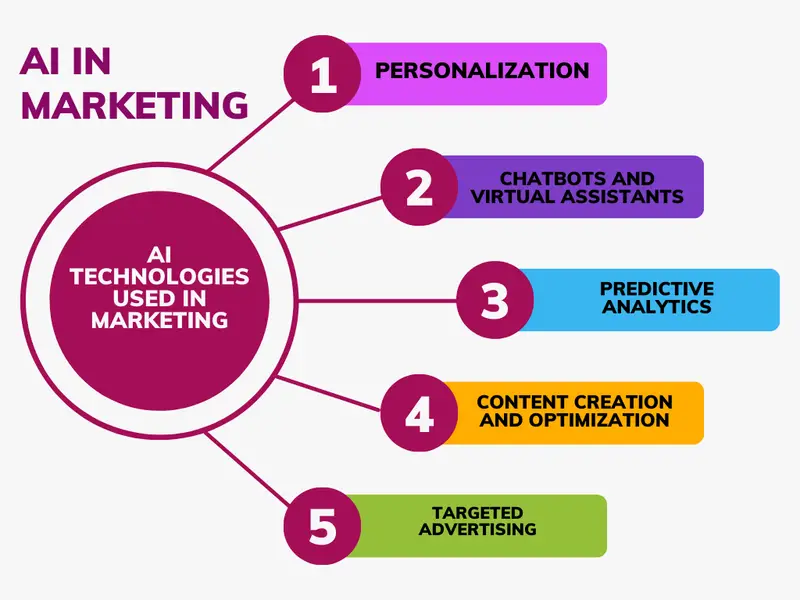AI in Marketing: Artificial intelligence (AI) is not just a buzzword anymore, it has become a game-changer now. From crafting personalized customer experiences to optimizing advertising budgets, AI has transformed how businesses approach their customers.
According to a study by Price Waterhouse Cooper, by 2030, AI would create more than USD 15 trillion for the global economy and boost local economies by up to 26%.
Another study by McKinsey found that marketing is the one business function that will have the biggest financial impact, second only to sales. AI in marketing has immense potential and can effectively boost ROI by analyzing data, predicting customer behaviour, and automating repetitive tasks.
By AI marketing we mean employing AI technologies such as data mining, predictive analytics, and natural language processing (NLP) to understand customer behaviour, personalize marketing campaigns, and optimize marketing strategies. With AI, marketers can make their marketing campaigns smarter and more effective, make searches better, target customers with tailored campaigns, and increase overall customer service. It is not just for tech giants or Fortune 500 companies anymore; startups, small businesses, and even solo entrepreneurs are harnessing its potential.
In this article, we will article, we will cover the current applications of AI in marketing, explore how it is shaping the future, highlight key players in the AI marketing space, and explain why embracing it now is a smart move for any business.
AI in Search: Benefits, Examples, and How It’s Transforming its Future
How are AI Technologies and Applications Used in Marketing?
AI has been in marketing for decades, but it is only now that this technology is being used widely. Here are some ways AI technology and applications are being used in marketing:

1. Personalization
Personalization has been a marketing goal for years, but AI takes it to a whole new level. AI algorithms analyze massive amounts of data, like browsing habits, purchase history, and even social media activity, to create tailored experiences. Companies like Netflix and Amazon are leaders in this area. Netflix uses AI to recommend shows and movies based on what you have watched. Also, the “Customers who bought this also bought” feature on Amazon is powered by AI.
According to a study by McKinsey, personalization can increase marketing ROI by up to 20%. The study stated that customers who experience personalized recommendations are also 80% more likely to make a purchase.
2. Chatbots and Virtual Assistants
AI-powered chatbots and virtual assistants have transformed the customer service segment as a whole. They can answer queries, solve issues, and guide users through the buying process, all without human intervention. They are used everywhere from e-commerce giants and banks to retailers and healthcare providers.
Let’s take the example of French beauty retailer Sephora. Sephora uses an AI-powered chatbot on its website and app to help customers find products, book makeovers, and get beauty advice. The bot uses natural language processing (NLP) to provide human-like responses.
Chatbots save companies time and money, handling up to 70% of customer inquiries without requiring a human representative. The major advantage of using AI for chatbots and virtual assistants is that they are available 24/7.
3. Predictive Analytics
AI does not just react; it predicts. Predictive analytics uses machine learning algorithms to forecast future customer behaviour based on past data. This helps marketers make smarter decisions about everything from inventory to advertising. By leveraging predictive analytics AI, brands can stay ahead of trends and anticipate customer needs before they even arise.
For example, Spotify uses AI to predict which songs or playlists a user might enjoy, keeping them engaged and on the platform longer. Similarly, fashion retailers like Zara use AI to predict fashion trends and adjust their inventory accordingly.
4. Content Creation and Optimization
AI can create content as well, be it text, image, audio, or video. AI-generated content is becoming increasingly prevalent in the digital marketing world, revolutionizing the way businesses create and distribute content. There are several generative AI tools like ChatGPT, Jasper AI, DaLL-E, Sora, and more that are helping marketers craft blog posts, ad copies, and even video scripts. While AI-generated content cannot replace human creativity, it speeds up the process and ensures quality.
AI also helps optimize content. Platforms like HubSpot and WordPress AI Editor analyze blog posts, suggest keywords, and predict how well the content will perform on search engines.
According to Forbes, by 2025, 90% of all internet content is expected to be AI-generated.
5. Targeted Advertising
With artificial intelligence, marketers can target their ads with laser precision. Platforms like Google and Facebook use AI algorithms to analyze user data and display ads to the right people at the right time.
For example, if you have recently searched for “best shoes for running,” do not be surprised if you see ads for Nike or Adidas in your social media feed. AI ensures advertisers get the most out of their ad spend by reaching audiences more likely to convert. This targeted approach not only increases the chances of a successful conversion but also improves the overall user experience by showing relevant ads.
AI in Media: Benefits, Examples, and How It’s Transforming its Future
Future of AI in Marketing
AI is revolutionizing marketing. Its possibilities to shape the future are endless. With time, AI-powered tools are becoming smarter, faster, and more intuitive, unlocking new opportunities for businesses to connect with their audiences in meaningful ways. The future of AI in marketing is promising even greater personalization, efficiency, and innovation. It will pave the way for a paradigm shift in how brands engage with customers.
One of the most promising uses of AI in marketing is hyper-personalization. AI algorithms are continuously improving, allowing marketers to deliver experiences that are not only tailored but also anticipatory. Instead of responding to customer behavior after it happens, future AI systems will predict needs and desires before customers express them.
For example, AI might suggest products or services based on real-time data, like weather conditions, local events, or recent life changes. This level of intensive personalization will redefine customer expectations and set new benchmarks for marketing success.
Another transformative trend is the integration of AI with immersive technologies like augmented reality (AR) and virtual reality (VR). These technologies, combined with AI, will allow brands to create interactive, engaging marketing campaigns that allow customers to experience products virtually before purchasing. Imagine a clothing retailer that uses AI to suggest outfits based on your body type and then lets you “try them on” virtually using AR.
These innovations will not only enhance the shopping experience but also increase conversion rates by reducing the uncertainty associated with online purchases.
AI will also play a crucial role in automating complex marketing processes. Soon, marketers will rely on AI to handle tasks like campaign planning, content creation, and performance analysis.
For example, AI-powered platforms could automatically design multi-channel campaigns, optimize them in real-time, and provide actionable insights based on performance metrics. This automation will free up marketers to focus on strategic decision-making and creative problem-solving, ultimately driving more impactful campaigns.
Predictive analytics is expected to become even more sophisticated. Future AI systems will become capable of analyzing historical data and also incorporate external factors like economic trends, geopolitical events, and consumer sentiment on social media. This holistic approach will enable businesses to adapt their strategies proactively, staying ahead of market shifts and customer preferences.
For example, a travel company could predict a surge in bookings for a specific destination based on AI’s analysis of social media buzz and adjust its marketing efforts accordingly.
Also, ethical AI will take centre stage in the future of marketing. As consumers are becoming more aware of data privacy and security, businesses will need to prioritize transparency and responsible AI use. Brands that can demonstrate ethical practices, such as providing clear consent options and ensuring data anonymization, will gain a competitive edge. AI will help marketers adhere to regulations by automatically flagging non-compliant content and practices, ensuring that campaigns meet legal and ethical standards.
The rise of conversational AI will also reshape customer interactions. Chatbots and virtual assistants are already streamlining customer service, but their future iterations will be even more human-like and emotionally intelligent. These AI-powered tools will not only answer queries but also understand the nuances of tone and sentiment, providing empathetic responses that build stronger customer relationships. For example, a chatbot could detect frustration in a customer’s message and escalate the issue to a human agent for immediate resolution.
Finally, AI will democratize marketing by making advanced tools accessible to small businesses and entrepreneurs. As AI solutions become more affordable and user-friendly, even those with limited resources will be able to compete with larger players. This democratization will foster innovation and create a more level playing field, allowing businesses of all sizes to harness AI’s power.
AI in Medicine: Benefits, Examples, and How It’s Transforming its Future
AI Companies and Startups in the Marketing Segment
Here are some key AI players operating in the marketing segment:
1. Salesforce Einstein
Salesforce’s AI platform, Einstein, integrates seamlessly into its CRM solutions to enhance marketing efforts. It uses predictive analytics, natural language processing, and machine learning to provide insights into customer behaviour, recommend actions, and automate tasks. Marketers leverage Einstein for email personalization, lead scoring, and optimizing customer journeys.
2. HubSpot
HubSpot incorporates AI into its marketing and sales platform, offering features like predictive lead scoring, content recommendations, and email optimization. Its AI-powered tools help small and medium-sized businesses create targeted campaigns and improve customer engagement without requiring advanced technical skills.
3. Adzooma
Adzooma is a startup that simplifies ad campaign management for businesses. Its AI-driven platform helps marketers optimize their Google, Facebook, and Microsoft advertising campaigns by providing actionable insights, identifying inefficiencies, and automating routine tasks.
4. Persado
Persado specializes in AI-powered content generation. The platform uses natural language processing (NLP) to create emotionally resonant marketing messages that drive engagement. Brands like Coca-Cola and Dell have used Persado to craft high-performing ad copy, email campaigns, and social media posts.
5. Pathmatics
Pathmatics leverages AI to provide marketers with deep insights into ad performance and competitor strategies. It helps brands optimize their digital ad spending and understand how their campaigns stack up against others in the industry.
6. Acrolinx
Acrolinx’s AI platform assists marketers in maintaining brand consistency and tone across all content. It analyzes written content to ensure it aligns with a brand’s guidelines and provides suggestions for improvement. This makes it especially valuable for companies managing large-scale marketing operations.
7. Emarsys (now part of SAP)
Emarsys is a leading AI-driven marketing platform that focuses on delivering personalized omnichannel experiences. It uses machine learning to recommend products, predict customer behavior, and automate email and SMS campaigns, enhancing customer loyalty and retention.
8. Phrasee
Phrasee uses AI to generate and optimize marketing language for emails, social media posts, and ads. Its machine-learning models analyze language patterns and customer responses to create messaging that resonates with target audiences, boosting engagement and conversion rates.
The Bottom Line
Artificial intelligence is here to revolutionize industries completely. Marketing is one of the segments where its potential is limitless. From personalization and automation to predictive analytics and content creation, the benefits of using AI are immense. It saves time, reduces costs, and delivers better results.
Companies that embrace AI will stay ahead of the curve, while those that hesitate may find themselves struggling to keep up.
AI in Cybersecurity: Benefits, Examples, and How it is Transforming its Future
FREQUENTLY ASKED QUESTIONS
- How is AI being used in Marketing?
AI is being used in marketing to analyze customer data and behaviour, personalize content and recommendations, automate processes like email campaigns, and even create targeted ads.
- What’s next for AI in Marketing?
The future of AI in marketing is likely to involve even more advanced personalization, real-time decision-making, and enhanced customer experiences. It will also play an increasingly important role in helping businesses connect with their target audiences in more meaningful ways.
- How does AI reduce costs in Marketing?
AI reduces costs in marketing by automating repetitive tasks, optimizing advertising spend, and improving overall efficiency in campaign management.


















